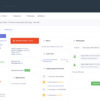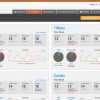
So now that we have microwaves spying on you and Congress voting this week to repeal Internet privacy protections that were approved by the Federal Communications Commission… what can we do to keep our data safe and private?
So wait, what happened?
Congress sent proposed legislation to President Trump that wipes away online privacy protections. This gives internet service providers (ISP’s) such as Verizon, AT&T and Comcast the freedom to monitor their customers’ behavior online and, without their permission, use their personal and financial information to sell highly targeted ads. They can also sell your data directly to other companies. This begins to change the role of an ISP from a utility like your water or electricity company to something very different.
What can you do?
Changing ISP’s won’t help and is usually pretty difficult. A few things that you CAN do if you’re concerned about your online privacy.
Opt Out
Your ISP may not need your permission to sell your data, but you can tell them not to. There’s no real guarantee that this will protect you completely, I’d wager that it’s highly unlikely that they will respect this request, but still… can’t hurt. Get on the phone or check the website of your ISP and opt out of every ad-related setting and into every privacy-related setting that you can find.
Use Secure Sites & Apps
Look at the address bar in your browser. If you see a little key or the URL starts with HTTPS://, you’re browsing securely and your data and information is being encrypted between your browser and the server. Your ISP can still find things like which domain you are visiting but they can’t snoop on the pages or the content.
Use a VPN
A VPN is a piece of software for your computer that allows you to encrypt all the data that passes through your ISP. This means that your ISP is still routing your data around, it can’t understand any of it. There are TONS of VPN applications out there and recommending one isn’t easy for a number of reasons, primarily because by using one you are putting your data and trust in that company. Data breaches for VPNs are not unheard of. Also, VPNs are not free and typically require a subscription. Do your research and find one you trust.
Browse with TOR
TOR Browser is a free, open source , web browser that prevents somebody who’s watching your internet connection from learning what sites you visit and it prevents the sites you visit from learning your physical location. It’s not Chrome or Safari but it’s free, secure and available for nearly every platform.
















